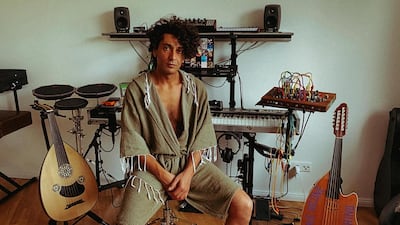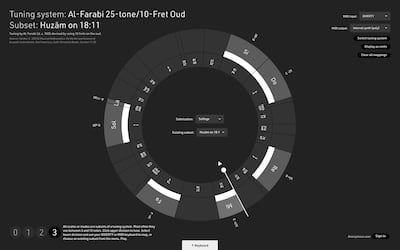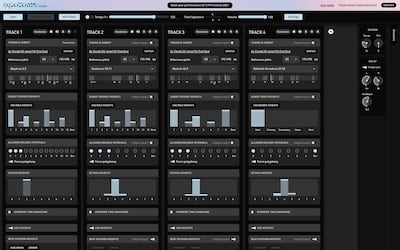Iraqi-British musician Khyam Allami began to study the oud at the age of 23, after years of learning guitar, bass and drums. The composer, who is now completing a PhD in composition at the Royal Birmingham Conservatoire, says that biases are deeply ingrained – even in modern music-making.
In an era when musicians and composers are increasingly dependent on digital apparatus, he says the dearth of tools catering to musicians working in traditions that use microtones, rather than the classical western 12-tone octave, reveals a deeply ingrained bias stemming from the supremacy of western music theory.
Introducing Leimma and Apotome
Frustrated by the way this bias has shaped global perceptions of what music is – and in turn limited how many musicians think and what they can do – Allami decided to take matters into his own hands, by launching two new purpose-built tools, Leimma and Apotome, named after Ancient Greek musical terms. The apps, developed in collaboration with Counterpoint the creative studio, run by Tero Parviainen and Samuel Diggins, were released last Friday as part of CTM Festival, an annual music and visual arts event in Berlin, which is taking place online until Sunday, February 14.
"I think that this supremacist narrative does exist, and rather than just writing some articles or doing a video essay to try and confront that narrative, I decided that creating tools musicians and anybody with a little bit of interest in music can use would be a far better way of encouraging a discussion within the wider communities, especially among musicians who are interested in their own or other non-western cultures," he says.
Leimma and Apotome work in tandem. Leimma is a tool for exploring different tuning systems, and the modes and scales they use. Musicians can experiment with scales from African, Middle Eastern, Chinese, Indian, Indonesian and Turkish traditions, and also create their own. Apotome builds on these systems to generate compositions based on the user's parameters and instructions.
Allami has also organised a series of events at the festival that demonstrate the potential of the apps for individual and collaborative composition and performance. On Tuesday, January 26, he will give a talk entitled Repressed Possibilities, introducing Apotome and the issues surrounding microtonal music.
It will be followed by performances by Wahono, an Indonesian producer and sound artist based in Jakarta; Deena Abdelwahed, a Tunisian producer and DJ who lives in Toulouse; and Slikback, a Kenyan DJ and producer who lives in Kampala.
On Wednesday, January 27, Allami will participate in a panel discussion, Dismantling Western Bias in Music Software and Music Education, followed by live-streamed concerts led by Allami and New York composer Faten Kanaan. They will use Apotome to generate live compositions and relay them to four synth musicians, who will modulate their sounds and timbres, accompanied by acoustic improvisation by cellist Lucy Railton.
In addition, a 24-hour live stream is running until the festival ends, playing compositions created in Apotome and accompanied by computer-generated visuals. Anyone interested in participating can use Apotome to create their own compositions and add them to the community pool to be included in the stream. Audiences can also sign up for a live slot in which to generate compositions that will be relayed in real time.
The liberation of musicians
Given that Allami launched Leimma and Apotome to liberate musicians and composers who feel constrained by the dominance of western music theory, both are free to use and run in a web browser, making them accessible to anyone with a laptop and the internet.
"What I realised is that all this time in my creative lifespan, I've been searching for a creative freedom that I couldn't have when dealing with digital tools or modern musical electronic tools," Allami says. "There are these very philosophical ideas about what it means to be free as a creative person today, in 2021, with all of these tools at our disposal, all of this technology at our disposal. I did not feel free, in any way, creatively."
Young Arab and non-western musicians who want to create music rooted in their own cultures often have to choose between studying a traditional acoustic instrument and making western-style music online, Allami says. "The tools are not there for someone to be in the middle, between having the interest in modern tools and modern sounds, and having the interest in their own culture and their own identity.
"I know that this is a huge problem in the Arab world, and it's a big problem when we think about music education, but I'm 100 per cent sure that it's exactly the same for young Iranian, Indian, Indonesian and African musicians."
From Arabic maqams to Indian ragas
The applications will allow users to switch from one tuning system to another mid-composition, a common feature of traditional melodies such as Arabic maqams and Indian ragas, but a practice not commonly found in western classical music. For those new to non-western musical traditions, the tools also provide much-needed context.
Existing online tools that allow musicians to work with microtonal tuning systems don’t provide information on how they are traditionally used, Allami explains, meaning that compositions made with them often sound strange or out of tune. Apotome generates compositions that take into account the traditional base notes and ornaments, allowing composers to get a sense of the way traditional melodies are formed.
“By doing that, you get an immediate feeling for what that subset means, so you feel a sense of context. Then the system generates all these different melodies depending on the parameters that you select, which are mostly done by sliders or check boxes.”
The tools have helped him to radicalise his own approach to composing. "The word 'decolonised' has become a bit of a buzzword and slightly lost its meaning, but in a way that's what these tools are trying to do. It really is about identity, and about being able to represent oneself and to challenge one's identity, and to break the rules and formations that are imposed on those identities by local culture and by international culture."
Allami is hopeful that Leimma and Apotome will prove to be useful educational tools. "When you read about microtonality, when you read about tuning, you only ever come across numbers and mathematical ratios," he says.
"It's very rare to have something that's interactive, where you can actually hear the difference, let alone something that allows you to compare the difference … I think it's going to make teaching non-western music theory a lot easier, especially when it comes to talking about pitch and melody. I think it's going to be incredibly simple and incredibly powerful."
The tools and the live stream from the CTM Festival can be accessed at www.isartum.net



